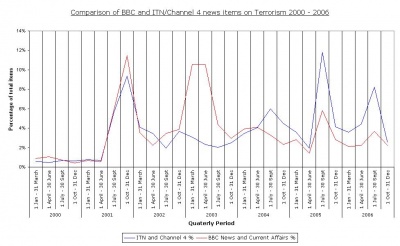Difference between revisions of "Terrorexpertise:UK Television List"
(analysis section added) |
(→Analysis: sp) |
||
| Line 883: | Line 883: | ||
==Analysis== | ==Analysis== | ||
| − | A | + | A separate page: [[Terrorexpertise:UK Television List Analysis]] includes a table displaying whether the top 30 experts from this list have affiliations to any (1) academic institutions (2) private Security/Intelligence firms (3) government or law enforcement agencies (4) military or intelligence services (4) private think-tanks or research institute and (5) the media. It also includes some analysis of this data. |
==Notes== | ==Notes== | ||
Revision as of 07:43, 23 May 2008
Below is a table showing appearances by Terrorism Experts on UK Television between 1 January 2000 and 31 December 2006. 435 names from the Bulk List were searched at the archives of the BBC Motion Gallery and ITN Source for appearances on ITN, Channel 4, BBC News and BBC Current Affairs programmes.
Only appearances relating to terrorism were recorded[1]. The table is arranged according to the total number of items returned, and then alphabetically according to surname.
In addition the graph on the right shows the percentage of items on terrorism returned during quarterly periods between 2000 and 2006 on the BBC compared with ITN and Channel 4. The graph apparently shows an increase in items on terrorism following attacks in New York, Madrid and London, the Israeli-Lebanon war, as well as a marked increase in BBC coverage in late 2002 to early 2003.
This list is one of a number compiled including:
- Terrorexpertise:Bulk List
- Terrorexpertise:Experts from the Social Science Citations Index
- Terrorexpertise:Experts from Google
- Terrorexpertise:Experts from Google Books
- Terrorexpertise:Experts from Elite Conferences
- Terrorexpertise:Experts from Major World Publications
- Terrorexpertise:Experts from The 'Terrorism' Industry
The Experts
Analysis
A separate page: Terrorexpertise:UK Television List Analysis includes a table displaying whether the top 30 experts from this list have affiliations to any (1) academic institutions (2) private Security/Intelligence firms (3) government or law enforcement agencies (4) military or intelligence services (4) private think-tanks or research institute and (5) the media. It also includes some analysis of this data.
Notes
- ↑ Any items referring to ‘terror’, ‘Islamic fundamentalism’, ‘extremism’ or ‘suicide bombing’ were treated as relating to terrorism.
